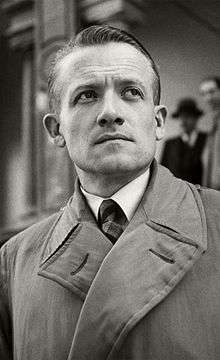Henri Frenay

Henri Frenay Sandoval (1905–1988) was a French military officer and French Resistance member.
Henri Frenay Sandoval, more commonly known as Henri Frenay,[1] was born in Lyon, France, on 11 November 1905, into a Catholic family with a military tradition. He studied the Germanic languages at the University of Strasbourg. Afterwards he became a soldier like his father and studied in Saint Cyr and the École Supérieure de Guerre and reached the rank of captain in 1934. At the outbreak of World War II, he rejoined the French army. German forces captured him in Vosges. He arrived in Marseille after escaping from a POW camp in Alsace on 27 June 1940.[1]
At first Frenay supported the Vichy Regime but was soon disillusioned by the Nazi tendency of the Pétain regime, and he subsequently formed the French Resistance group Mouvement de Libération Nationale in 1940. He became an editor of underground newspapers such as Vérités (Truths) and had a hand in the formation of the Combat group[1][2] in November, 1941. In 1943 his group participated in the forming of the Conseil National de la Résistance of Jean Moulin but Frenay refused a seat due to a disagreement over the admission of political parties to the Counseil.
When the Gestapo captured Jean Moulin, Frenay fled to Algiers. In November 1943 he met Charles De Gaulle who appointed him as a minister of prisoners, refugees and deportees.
After the war, Frenay served in De Gaulle's first provisional government. Afterwards he retired from the political life and became a businessman. He published his autobiography, The Night Will End: Memoirs of a Revolutionary in 1976.
Henri Frenay died at Porto-Vecchio, Corsica on 8 August 1988.
References
Citations
- 1 2 3 Argyle (2014), p. 156
- ↑ Westerfield (2004), p. 184
Bibliography
- Argyle, Ray (2014), The Paris Game: Charles de Gaulle, the Liberation of Paris, and the Gamble that Won France, Dundurn, ISBN 978-1-4597-2287-3
- Westerfield, Lillian Leigh (2004), 'This Anguish, Like a Kind of Intimate Song': Resistance in Women's Literature of World War II, Rodopi, ISBN 90-420-1148-3